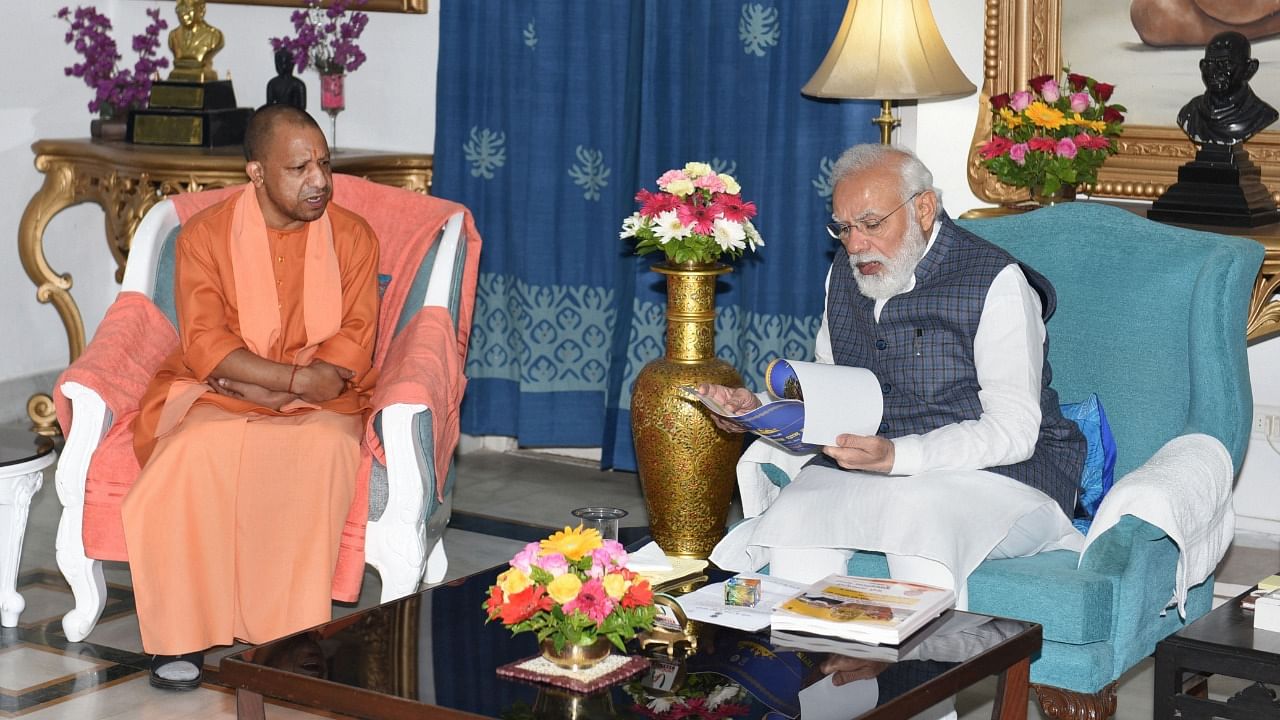
In the winter of 1999, Sangh Parivar ideologue Dattopant Thengadi told a Bharatiya Mazdoor Sangh (BMS) convention in Nagpur that Atal Bihari Vajpayee, the then prime minister, was a "petty politician" who has played into the hands of policy advisers with doubtful credentials.
Thengadi, the founder of RSS economic think tank Swadeshi Jagran Manch, opposed the Vajpayee government's economic reforms. In 2001, Thengadi, with communist leader Gurudas Dasgupta by his side at a protest at Delhi's Ramlila Maidan, hollered that the Vajpayee government's disinvestment policy has betrayed the economic interests of India's working class and called the finance minister names.
That was 20-years back. The Rashtriya Swayamsevak Sangh (RSS) learnt from those mishaps. As its leadership has shown in recent months, the Sangh has devoted itself to ensuring a Bharatiya Janata Party (BJP) victory in the crucial Uttar Pradesh Assembly polls. It has reined in its affiliates, like the BMS and Bharatiya Kisan Sangh, who are upset with the Modi government's economic and agriculture sector reforms.
In the summer of 2021, as speculation of a Modi-Yogi Adityanath standoff swirled in Lucknow, RSS leaders intervened to pave the way for a truce. Top functionaries Dattatreya Hosabale and Krishna Gopal persuaded Chief Minister Adityanath to also pay a rare visit to the residence of his ministerial colleague, Deputy CM Keshav Prasad Maurya, for lunch. Hosabale visited Lucknow thrice to broker peace among the warring sections of the UP BJP.
When the Lakhimpur Kheri incident, after a union minister's son allegedly mowed down farmers, threatened to turn the tide of popular opinion against the BJP, the RSS feedback suggested the Centre withdraw the farm laws. "We know it advised the BJP leadership since its workers struggled to reach out to people who are upset because of farm laws," farm leader Pushpendra Singh says.
Despite its reservations on the farm laws, the Bharatiya Kisan Sangh, the farm union affiliate of the RSS, did not join or launch any protests in the last 12-months. After the PM's announcement on Friday morning withdrawing the farm laws, the Kisan Sangh issued a measured statement calling for a law on minimum support price (MSP).
It isn't that there were no dissenting voices in the RSS and BJP over the three farm laws. Naresh Sirohi, former national vice president of the BJP's farmers' cell, Meghalaya Governor Satya Pal Malik and party's Lok Sabha MP Varun Gandhi publicly criticised the farm laws. But most in the Sangh Parivar shared their misgivings privately with the leadership.
Opposition is hopeful farm protests will help protests against other economic policies, notably the government's plan to monetise public assets. "We need to fight a decisive battle on that front, for example, to protect the assets of the Indian Railways," former MLA Sunilam, who has been associated with farmers' agitation, says. However, the unwillingness of the Sangh affiliated unions has made any sustained strikes difficult.
If the friction between the RSS, its affiliates and BJP's government at the Centre played out in the open 20-years back, it is all but absent since 2014. The RSS leadership disagrees and suggests within the four walls. One notable exception is the friction between Adityanath, the UP chief minister, and the central BJP leadership.
However, insiders believe the PM's recent actions - inaugurating the Purvanchal Expressway and announcing the withdrawal of the farm laws himself - have signalled that UP 2022 is more his fight than Adityanath's. The farm unions say they will continue with their "no vote to the BJP" campaign despite the withdrawal of the farm laws, but the Sangh Parivar sources are upbeat protests will soon peter out in western UP.
The 2013 Muzaffarnagar riots were crucial in the politics of western UP. In the aftermath of the riots, the Jat-Muslim social alliance severed, helping the BJP get Jat support. The farm agitation has sought to heal those wounds.
But with farm laws soon to be withdrawn, the Sangh is confident of regaining the confidence of Jats in western UP and undoing the damage that events of January 28 this year at Delhi's Ghazipur border did to its support base among the community. On that day, Rakesh Tikait's tearful appeal that he would end his life but not the protest had rejuvenated it in western UP. The family had supported the BJP in 2014.
With the three laws withdrawn, the Sangh Parivar believes Jats would be more amenable to heed the message of nationalism from its volunteers. It has tasked them to organise programmes to celebrate Amrit Mahotsav on the occasion of 75 years of independence. ''Our workers will be reciting Vande Mataram with the people and recall the sacrifice of unsung freedom fighters,'' said a Sangh leader in Lucknow.
The RSS would focus on rashtravaad (nationalism), Hindutva, religious conversions, cow protection and Ram Temple in the forthcoming Assembly polls in the state. "These issues have always been on our agenda; there is nothing new,'' the leader said.
However, with anger over farm laws likely to dissipate, the Sangh Parivar's agenda is simple. It knows Jats have rediscovered their love for Jayant Chaudhary-led Rashtriya Lok Dal, and the reentry of Tikaits in electoral politics is likely. The RSS-BJP now hope to influence Jats to vote for the BJP wherever RLD's ally Samajwadi Party contests in the 120-odd seats of western UP.